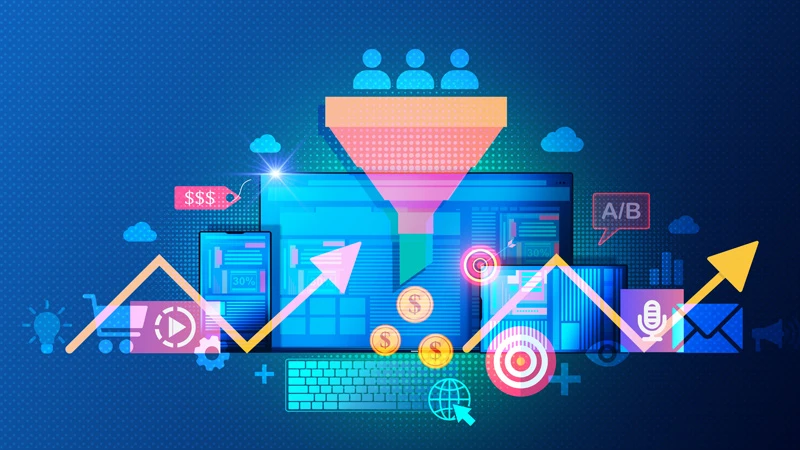Open Performance and Development With AI Automation for B2B Firms
AI automation is changing the landscape for B2B companies. It enhances procedures and minimizes dependence on human intervention. This shift allows businesses to make quicker, data-driven decisions. As companies explore which refines to automate, they have to additionally think about the right tools to execute. Difficulties remain in taking on AI modern technology. The effects of these modifications can shape the future of many companies in means yet to be completely understood
Comprehending AI Automation in the B2B Context
As businesses increasingly look for efficiency, comprehending AI automation in the B2B context becomes crucial. AI automation includes employing innovative technologies to simplify operations, minimize human intervention, and improve decision-making procedures. In the B2B landscape, this can materialize in numerous forms, such as automating customer care communications, taking care of supply chain logistics, or enhancing marketing projects. Firms can take advantage of AI to assess enormous datasets promptly, enabling them to determine fads and understandings that educate tactical selections. In addition, AI systems can integrate effortlessly with existing modern technologies, offering a cohesive platform for handling organization features. This understanding prepares for organizations to check out just how AI can transform their operations, boost performance, and ultimately foster sustainable growth in a competitive market.
Secret Benefits of Executing AI Automation

Identifying Processes Ideal for Automation

Selecting the Right AI Tools for Your Organization
When B2B firms think about automating their procedures, choosing the best AI devices comes to be important for achieving desired outcomes. Business should begin by examining their distinct needs and objectives, making sure alignment with organization goals (Minarik AI). Assessing the assimilation, scalability, and flexibility abilities of possible tools is important, as these factors figure out long-term efficiency. Organizations needs to also consider user-friendliness and the level of assistance given by suppliers, as these aspects can influence effective implementation. In enhancement, examining consumer reviews and study can supply understandings into exactly how specific AI options do in real-world circumstances. By diligently selecting AI tools that fit their operational demands, B2B business can improve effectiveness and drive growth while lessening possible interruptions
Getting Rid Of Obstacles in AI Fostering
B2B companies commonly experience significant obstacles in adopting AI modern technologies, particularly concerns related to data top quality and resistance to alter management. Poor data quality can prevent the efficiency of AI systems, while worker hesitation to embrace new procedures can stall implementation efforts - AI Automation For B2B. Addressing these obstacles is crucial for effective AI integration and optimizing its possible benefits
Information Top Quality Issues
Ensuring high information high quality is essential for the effective adoption of AI technologies in business-to-business atmospheres. Incorrect, insufficient, or outdated information can significantly hinder AI campaigns, resulting in wrong insights and inadequate decision-making. Companies usually deal with obstacles such as data silos, incongruities across various resources, and a lack of standard information styles. To overcome these issues, companies must spend in information cleaning, integration, and governance procedures. Executing durable data administration techniques guarantees that the details fed into AI systems is reliable and appropriate. Fostering a culture of data high quality awareness among employees can improve data precision over time. By attending to data quality worries, B2B firms can launch the complete possibility of AI automation, driving efficiency and development.
Adjustment Management Resistance

Gauging the Impact of AI Automation
Determining the influence of AI automation in B2B firms requires a clear understanding of vital performance signs (KPIs) that line up with organization objectives. Effective data evaluation techniques are vital for analyzing the outcomes, while durable ROI assessment techniques aid determine the financial benefits of automation efforts. Together, these elements give a considerable framework for examining AI's payments to business success.
Secret Efficiency Indicators
Trick efficiency indications (KPIs) act as essential devices for B2B companies to assess the performance of AI automation campaigns. By establishing clear metrics, organizations can measure improvements in operational efficiency, expense reduction, and revenue growth straight attributable to automation. Usual KPIs consist of cycle time reduction, mistake rates, customer fulfillment scores, and employee productivity degrees. These indicators provide understandings right into exactly how AI systems are optimizing processes and enhancing overall performance. In addition, tracking KPIs allows companies to recognize locations for further improvement and to straighten AI automation efforts with strategic organization goals. Ultimately, a distinct framework of useful link KPIs guarantees that B2B firms can quantitatively examine the impact of AI automation on their procedures and drive continual growth.
Data Evaluation Techniques
Reliable data evaluation techniques play a vital role in examining the impact of AI automation within B2B firms. By using analytical techniques, organizations can recognize trends and patterns in functional information, enabling them to analyze the performance acquires attained through automation. Strategies such as regression analysis and time series projecting supply insights into just how AI-driven processes influence performance and decision-making. Additionally, information visualization tools can successfully connect findings to stakeholders, promoting informed calculated choices. Artificial intelligence algorithms can even more improve evaluation by forecasting future results based upon historic data, providing actionable insights. Eventually, these strategies enable B2B companies to measure success and enhance their AI automation efforts, making certain positioning with organization purposes and enhancing overall performance.
ROI Assessment Strategies
Examining the return on financial investment (ROI) of AI automation is important for B2B business seeking to understand the financial ramifications of their technical efforts. Business can utilize different ROI evaluation techniques to evaluate the efficiency of AI executions - Growth Systems For B2B. One efficient method includes calculating cost savings by comparing functional expenditures before and after automation (Minarik AI). Furthermore, determining productivity renovations with essential performance indications (KPIs) helps evaluate the advantages of AI. Customer satisfaction metrics can additionally give understandings right into the effect of automation on service top quality. To ensure a detailed analysis, firms need to think about both straight financial returns and abstract benefits, such as enhanced decision-making capacities and affordable advantage. This multifaceted examination enables B2B firms to make informed choices regarding future investments in AI modern technology
Future Trends in AI Automation for B2B Business
What innovations exist in advance for AI automation in B2B companies? Arising patterns show a significant change in the direction of enhanced information analytics capacities, enabling services to make even more educated decisions. Anticipating analytics will certainly become progressively essential, enabling firms to anticipate market changes and consumer demands. In addition, the assimilation of AI with Internet of Points (IoT) technology is expected to enhance operations by offering real-time insights and automation of processes. Firms will certainly additionally concentrate on boosting client experiences via individualized advertising and marketing driven by AI formulas. Furthermore, advancements in all-natural language handling will certainly help with far better communication between clients and companies. As these fads develop, B2B companies should adapt to utilize AI automation efficiently, making certain sustained growth and competitive benefit.
Regularly Asked Inquiries
What Industries Benefit the Most From AI Automation in B2B?
Manufacturing, financing, health care, and logistics industries benefit the most from AI automation in B2B. These industries leverage AI to optimize procedures, improve decision-making, and boost total operational efficiency, driving substantial growth and development.
Just How Does AI Automation Impact Employee Duties and Responsibilities?
AI automation reshapes employee functions and obligations by streamlining recurring jobs, allowing workers to concentrate on strategic initiatives. This shift cultivates ability growth, improves productivity, and motivates partnership, ultimately driving business development and technology.
What Prevail Misconceptions Regarding AI Automation in B2B?
Typical misunderstandings concerning AI automation in B2B include worries of task loss, ideas that AI can totally change human judgment, and underestimating the relevance of collaboration in between AI systems and staff members for optimal outcomes.
Just How Can Businesses Ensure Data Privacy With AI Automation?
Services can ensure information privacy with AI automation by implementing durable file encryption protocols, sticking to governing compliance, carrying out regular audits, and training staff members on data handling practices to reduce dangers and secure sensitive information.
What Are the Prices Linked With Implementing AI Automation?
The expenses linked with implementing AI automation include software application purchase, framework upgrades, training workers, recurring maintenance, and potential downtime during integration. In addition, companies might incur expenses associated with data safety and security and conformity actions.
Gauging the influence of AI automation in B2B business requires a clear understanding of vital performance indicators (KPIs) that straighten with company goals. Key efficiency indicators (KPIs) offer as necessary tools for B2B firms to evaluate the effectiveness of AI automation campaigns. Effective information analysis strategies play a necessary role in reviewing the influence of AI automation within B2B companies. Reviewing the return on investment (ROI) of AI automation is crucial for B2B business looking for to understand the monetary implications of their technical initiatives. What advancements lie ahead for AI automation in B2B firms?